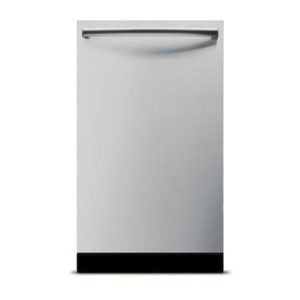Detergent
Displaying 1 - 1 of 0 Articles
Categories
-
July 28, 2017
When is it time to call for appliance service?
Getting Your Appliance FixedHow do you know when to call?Here's when you don't need appliance service: Your refrigerator water filter needs replacement. You should be able to do this yourself. If for some reason you can't, a handyman can do this for you. Your washing machine has an inlet hose that is leaking. Replace the leaking hose (I'd replace both hoses). No need for a service call. The dishwasher is not getting your dishes clean. There could be many reasons for this other than a malfunctioning dishwasher. Maybe the incoming water is not hot enough. Hard water can be a problem. There's not enough or too much detergent. You might need to use a rinse agent, or additive.Here's when you do need to call for service: Your refrigerator is not cooling. You've plugged and unplugged, and tested the electric outlet so that you know your fridge is getting power. Nevertheless, your food is spoiling. Call for service. Your washing machine suddenly made a loud grating sound, and ground to a halt. Now you can't get it to do anything. You need a qualified service agent. The dishwasher will start, fills with water, etc. but it just doesn't do anything. No noise, no water movement, no nothing. Your neighbor says, it's probaly the pump and/or motor.You get the idea. Some simple things like changing filters are not reasons to call for service. When appliances have critical failures, that can't be fixed by turning the power back on, etc. it's time to
-
July 14, 2017
Dishwashing Tips for Cleaner Dishes
Three tips for cleaner dishesTry these tips for cleaner dishes, or get a new dishwasher at UAKC Here are three suggestions to make sure you're getting the most out of your dishwasher:1. Don't pre-clean your dishes.Some people want to give their dishwasher a little help by pre-washing their dishes. While you certainly don't want to put your leftover for baked on food in your dishwasher, it is not a good idea to rinse off your dishes before placing them in the dishwasher. Dishwasher detergents contain chemicals that keep food particles removed from the dishes in suspension so that they don't get redeposited on your dishes. If you put only clean dishes in the dishwasher, the detergent will find no dirt particles and wind up as a film on your already clean dishes.2. Hot water gets dishes clean.Typically, dishwashers will heat incoming water to 150 degrees or more depending on the cycle selected. However, the incoming water needs to be 120 degrees for this to happen. Even if your water heater provides water at 120 degrees, if your dishwasher is located too far from the water heater, the hot water may not be hot enough by the time it gets to the dishwasher. My water heater is at one corner of my house, and my dishwasher is clear over at the other corner, as far as it can be from the water heater. We need to run the hot water at the sink near the dishwasher for a few minutes before we
-
February 12, 2016
New Electrolux Award-Winning Washer
K&BB 2016 Award WinnerComing Soon to Universal Appliance and Kitchen Center Electrolux Front Load Washer Model EFLS617(NEW) SmartBoost™ introduces an exclusive technology that infuses water with detergent in a special chamber before the cycle begins, for a deep clean that removes tough stains in all cycles.LuxCare™ Wash system features improved wash actions, perfect cycle timing, temperature control, and smart load sensing.Perfect Steam™ option vents steam from the bottom to effectively remove stains. This new Electrolux washer won best in class from Kitchen and Bath Business at this year's KBIS in Las Vegas. The new Electrolux SmartBoost™ wash system premixes the water and detergent before the wash begins for a deeper cleaning which promises to get at those hard to remove stains regardless of the cyle. It's also loaded with the additional features below:Features Front-load design 4.4-cubic-foot capacity SmartBoost™ LuxCare™ wash system 15-minute Fast Wash cycle Sanitize option StainSoak option Perfect Steam™ option Extended Refresh option Fresh water rinseFor the best selection in Electrolux or other major appliances and plumbing fixtures cal or visit the pros at Universal Appliance and Kitchen Center. The new Electrolux EFLS617 model featured above will be available in April 2016. To view the current Electrolux models at UAKC, click on the link below:Electrolux Washers and DryersBookmark this blog and return often for the latest news in major appliances and plumbing fixtures.![wpid-Photo-20160212160714051.jpg wpid-Photo-20160212160714051.jpg]()
-
April 17, 2015
3 Water-Saving Dishwashing Tips
Save water when washing dishes We've previously written about ways to save water in your home during this drought. Click on the link below: Saving Water In Your Home Now, we'd like to specifically call your attention to saving water with your dishwasher. Here are three simple ways to save water when washing dishes. 1. Use your dishwasher. Research has shown a surprising number of households who have dishwashers do not use them. Sometimes residents believe that by hand washing they'll get their dishes cleaner, that it's more sanitary, and they'll use less water. Of course, none of this is true. Hand washing dishes uses far more water, is likely to not do as good a job getting dishes clean, and is definitely less sanitary than using a dishwasher. 2. Don't pre-wash dishes. For decades dishwasher manufacturers have been imploring homemakers to forego pre-washing dishes before they put them in the dishwasher. There are two important reasons that we should not pre-wash dishes. First, it's a huge waste of water. You're bound to use as much water pre-washing the dishes as your dishwasher uses for the entire cycle. Also, pre-washing your dishes can actually cause your dishes to come out of the dishwasher dirty, and in some cases it may even damage your dishes (especially glassware). Dishwasher detergent removes dirt molecules from the dishes and suspends them in the water where they get flushed out of the dishwasher. When the dishes are pre-washed, the dishwasher is unable to capture dirt![wpid-Photo-Feb-23-2015-550-PM.jpg wpid-Photo-Feb-23-2015-550-PM.jpg]()
-
March 04, 2015
How Your Dishwasher Works
3 Ways Dishwashers Get Your Dishes CleanThere are three processes that contribute to your dishwasher getting your dishes clean. They are: Mechanical, Thermal, and Chemical actions. These processes work together to assure you the best possible cleaning results that will make your dishes shine.MechanicalThe motor and pump of the dishwasher force water through the holes in the spinning spray arms, creating powerful streams of water that peel stuck on food particles from your bowls, dishes, glasses, pots, pans, and silverware. Dishwasher insulation, and quiet, smooth-running motors and pumps enable your dishwasher to powerfully scrub your dishes with a minimum of noise.ThermalDepending on the cycle selected, water is heated to 120-140 degrees (even more for a sani-cycle). Hot water not only breaks down the detergent (see below), it also helps loosen and remove food particles from the dishes, and carries the debris through a filter and down the drain. During the rinse cycle, fresh, clean water leaves your dishes sparkling. If selected, an NSF sanitizing cycle adds more heat; 155-160 degrees for a prescribed time. A drying cycle, usually heat assisted, finishes the job. ChemicalDetergent, and rinse agent are released into the dishwasher at the proper times in the wash or rinse cycles to mix with the hot water. The hot water and detergent mix together enabling the water to "scrub" stuck on food particles from the dishes, glasses, and silverware. In addition, the detergent helps suspend the dirt in the water so that it does not redeposit on the dishes,
Displaying 1 - 1 of 0 Articles



